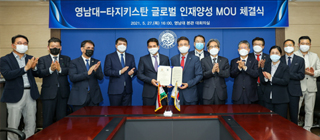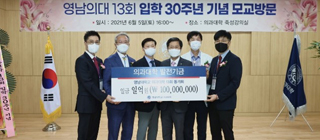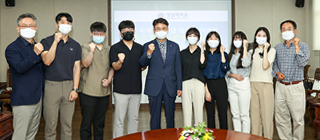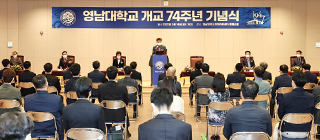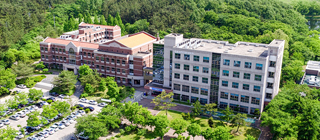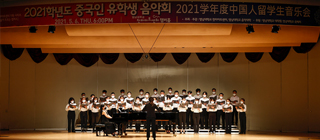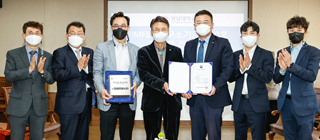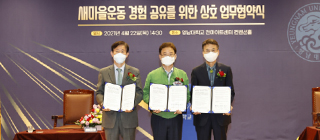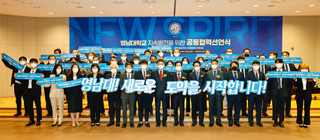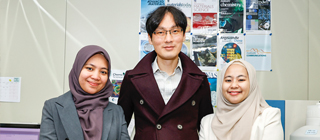-
On the 27th, signed international MOU with Tajikistan with high-ranking officials present such as the Ministry of Industry and New Technology Fostering personnel in the international development and Saemaul... agreed to install Saemaul Department at local universities and open a Saemaul Institute YU to engage in academic sharing of Saemaul Undong and to act as national policy adviser together with developing countries [May 27, 2021] YU (President CHOI Oe-chool) is actively responding to requests for fostering human resources in international development and Saemaul studies in Central Asia. At 4 p.m. on the 27th, YU entered an international MOU for fostering global talents together with the Ministry of Industry and New Technology of Tajikistan. Tajikistan became an independent country in Central Asia with the breaking up of the USSR in 1991 and it shares a border with China with a population of 9.75 million. This MOU signing ceremony was held at the main conference room of the main hall of YU. The high expectations for this MOU were demonstrated by the presence of high-ranking officials of Tajikistan such as the Minister of Industry and New Technology Sherali Kabir, Chair (minister-level) of the Investment and State Asset Operation Committee Sadi Qodirzoda, Ambassador to Korea Yusuf Sharifzoda, and Commercial Attaché to Korea Rakhmadzoda Azim, as well as the Tajikistan Free Economic Zone Director Shim Jae-bok. With this MOU, YU and Tajikistan agreed to engage in higher education cooperation and human exchange for the development of national human resources. In particular, YU plans to especially focus on pursuing cooperation in the Saemaul international development sector, which it is recognized internationally for its research and education capacities. Plans are to install and operate a Saemaul Department at a local university and open a Saemaul Institute in Tajikistan for sharing and cooperation in Saemaul Undong. Tajikistan Minister of Industry and New Technology Sherali Kabir said, “I am well aware of the development experience and Saemaul Undong of Korea, which has had amazing development in a short period of time. We expect that this MOU with YU, which has academic knowledge and knowhow on the Saemaul Undong and international development, will help forge the foundation for the economic development of Tajikistan.” This MOU was made with the assertive requests by the government of Tajikistan to YU for sharing the Saemaul Undong and to foster human resources. In order to quickly spread the Saemaul Undong in Tajikistan, YU intends to foster public employees recommended by the government of Tajikistan into instructors at the YU Park Chung Hee School of Policy and Saemaul. Developing countries around the world are seeking out YU’s ‘Saemaul’ and with this MOU with Tajikistan, it is expected that sharing of Saemaul development studies will become even more active in Central Asian countries. It is further anticipated that it significantly increase people from Central Asian countries studying abroad at YU. YU has not only expanded academic sharing of the Saemaul Undong through departments related to Saemaul studies in countries like Cambodia, Rwanda, Zambia, Ethiopia, and Tanzania, but is also serving as a higher education institute that serves as an adviser for developing countries in conjunction with rural development and Saemaul development.
-
The 13th College of Medicine Alumni held a ‘Homecoming Day’ event after 30 years since admission Also provided 20 million KRW for scholarship funds and development funds by the College of Medicine Alumni Association 30th year anniversary of each class donating development funds becomes a tradition of the YU College of Medicine [June 5, 2021] The 13th YU College of Medicine alumni donated 100 million KRW to their alma mater. They gathered together to help with the development of their alma mater and juniors in commemoration of the 30th years anniversary since their enrollment. At the ‘Homecoming Day’ (steering committee chair Kim Jong-soo) held on the 5th at the YU College of Medicine Jukseong Lecture Hall to commemorate the 30th year anniversary since being admitted to YU, about 20 people gathered at the alma mater on behalf of the 13th alumni association. At this event were present Executive Vice President for Educational Innovation Kim Jae-choon, Executive Vice President for Medical Affairs and Director of Medical Center Kim Jong-yeon, Dean of the College of Medicine Lee Gyeong-hee, College of Medicine Alumni Association Chair Kim Jong-yeong, and about 50 students at the College of Medicine welcomed the alumni. Here, the 13th College of Medicine Alumni Association donated 100 million KRW for school development funds and an additional 20 million KRW as College of Medicine Alumni Association scholarship funds and development funds. Development fund donations by the YU College of Medicine alumni have long become a tradition. Up until now, homecoming days were held for the 30th anniversary of each class where they donated development funds for the alma mater as well as development funds and scholarship funds for the alumni association. Steering Committee Chair Kim Jong-soo said, “It is quite emotional to see alumni, professors and my seniors and juniors who enrolled at YU and worked on our dreams as medical professionals remembering the spirit of Chunma 30 years ago. Through this event, we hope to strengthen friendships among fell alumni as well as our love for alma mater.” YU College of Medicine Dean Lee Gyeong-hee said in his welcoming address, “I hope that this homecoming event will be a meaningful time to think back on the happy memories made back on campus. I ask for your continued support and interest for the development of YU and junior students.” Meanwhile, the 13th YU College of Medicine alumni that attended this event took a tour around the YU College of Medicine campus where their juniors study following the donation ceremony, and also listened to explanations on the development of the school, and then took the time to encourage their juniors.
-
5 for administrative and 2 for technical positions... Highest number of passers among universities in Gyeongbuk 28 passed the exam over the past 5 years, proving the nation’s highest competency Result of providing systematic support throughout the entire process by the University Job Center including written tests and interviews [June 4, 2021] YU (President CHOI Oe-chool) recorded 7 students passing the ‘2021 National Position Local Human Resources Grade 7 Apprenticeship Examination.’ This is the highest number among universities in the Gyeongbuk region. The Ministry of Personnel Management recently announced the final list of 160 passers (100 administrative, 60 technical) of the ‘2021 National Position Local Human Resources Grade 7 Apprenticeship Examination.’ Among them, a total of seven with five in administrative positions and two in technical positions were from YU. In the administrative positions they are Bae Eun-ho (25, School of International Economics and Business, graduated), Choi Yeon-soo (25, Department of Public Administration, graduated), Park Da-woon (24, Department of English Language Education, graduated), Bae Hyo-jin (24, Department of History, graduated) and Yoon Ae-jin (22, Department of Public Administration, graduated), and in the technical positions, they are Ryu Tae-moon (26) and Lee Yoo-jeong (24, both graduated from the Department of Statistics). There were also seven last year who graduated from YU for a total of 28 in the past 5 years, showing that it has the nation’s highest competitiveness in the local human resource grade 7 apprenticeship examination. This was the result of setting up an exclusive department (University Jobs Center) by the university to provide systematic and assertive support. YU takes care of students throughout the entire process ranging from university recommendation to written tests and interviews. Miss Choi Yeon-soo, who graduated in February, commented, “I applied for and prepared for the National Position Local Human Resources Grade 7 Apprenticeship Examination program supported by YU early on. It was difficult to find a place to study with other students preparing for the test last year due to COVID-19, but the school provided a study room, so I was able to study and prepare for the exam with other students. In particular, the PSAT that the school administered continuously was especially helpful. If you are preparing to become a public employee, I would strongly recommend participating in programs offered by the university.” Every year, YU gathers students preparing for the ‘National Position Local Human Resources Grade 7 Apprenticeship Examination’ to come up with lesson plans to prepare for written tests, etc., while also assigning advisers to provide individual guidance. Furthermore, the University Jobs Center provides mock tests and study groups to prepare for the written test, while also assisting students to prepare for interviews through meetings with seniors who passed the test in the past. YU University Jobs Creation Center Director Jung Jin-young said, “In preparation for the ‘National Position Local Human Resources Grade 7 Apprenticeship Examination’ the university provides systematic support for all processes from the recruiting stage to public position aptitude tests, interviews, and all the way to the final passing, and has been quite successful every year,” and further added, “The University Jobs Center also operates various customized employment and career guidance programs such as for general companies and public institutes aside from public employee positions. We will provide full support so that students can find career paths according to their aptitudes, and so that they can get hired by places they want.” The 'National Position Local Human Resources Grade 7 Apprenticeship Examination’ was implemented in 2005 for balanced employment of local personnel and to strengthen regional representativeness in public positions. Students or graduates that meet certain criteria and are recommended by the university president are selected through a written test administered by the Ministry of Personnel Management (PSAT) and then complete document review and interviews. Those who pass this year will be admitted to the National Human Resources Development Institute in the first half of next year where they will receive basic education on adapting to public service and to enhance work capacities, and then they will begin their apprenticeships at the respective central administrative institutes. The apprenticeship last for about 1 year and once they complete it, they will be hired as full-time public employees through evaluations on their work execution.
-
Awards for excellent lecturing professor, excellent research professor, excellent employee, exemplary department, etc. ‘Special Faculty Merit Award’ and ‘Employee of the Year Award’ for contributions to the development and innovation of the university “Need to reform university structure to fit the changes of the times... Should be joined by all members of the university” [May 14, 2021] YU (President CHOI Oe-chool) held its 74th year anniversary at the Chunma Art Center 3rd floor Convention Hall at 11 a.m. on the 14th. At this ceremony were present not only members of YU such as YU President CHOI Oe-chool, key professors, Faculty Assembly Chairman Kim Sam-soo, Employee Labor Union Chairperson Kwon Ki-young, Student Body President Kim Dong-gyu, etc., but also Yeungnam School Foundation Chair Han Jae-sook, Director Kim Jin-sam, Yeungnam University College President Lee Jae-yong, YU Alumni Association Senior Vice-chairman Koh Dong-hyun and others to congratulate the 74th anniversary since the founding of YU. YU President CHOI Oe-chool said in his congratulatory address, “The environment both within and outside of the university is very difficult. It is comparable to the ‘IMF crisis of Korean universities’.” He added, “It is necessary to make improvements to the university structure in order to react to the changes of the times and educational demands. We will preemptively react to pave the foundation for the 100-year history of YU. I urge all of the members of YU to take part in creating the ‘Great 100 year history of YU’ together.” Following the report on the major milestones of the university, 64 people were awarded for their long years of service, 5 received the Chunma Honors Excellent Lecture Professor Award, 25 received the Excellent Lecture Professor Award, 15 received the Excellent Research Award, 1 received the Special Faculty Merit Award, 3 received the Employee of the Year Award, 11 received the Exemplary Employee Award, and 1 person won the Alumni Association Chairperson’s Award. The Museum Curator Office and Academic Registrar Team were selected for as Exemplary Departments. Particularly at this year’s YU Anniversary Event, the ‘Special Faculty Merit Award’ and ‘Employee of the Year Award’ were enacted to award professors and employees who contributed to the development and innovation of the university. This year’s Employee of the Year Award was bestowed using the development funds that the CEO of SR Kim Yong-beom donated to YU in February. It aims at creating a working culture of complimenting and encouraging by selecting and awarding outstanding employees who contributed to the development of the university. Meanwhile, attendees were limited to minimal numbers to prevent the spread of COVID-19 for this event, and it was aired live online via the YU YouTube channel.
-
49 out of 71 students in 10th class pass for a passing rate of 69% First place last year, and has been ranking first and second together with Seoul National University for the past 3 years Accumulated rate of earning master’s degree compared to admitted students third in nation... Proving the fostering of high quality law professionals [May 12, 2021] <Panoramic view of the YU Law School> YU Law School ranked second in the nation for passing rate of the 10th bar exam (based on 10th law school class), once again proving that it is the best law school in Korea. The Ministry of Justice recently released data on passers of the 10th bar exam by university. In result, YU Law School passed 49 of its 71 students in its 10th class to rank second in the nation at a passing rate of 69%. YU was ranked behind Seoul National University (1st) and was followed by Korea University, Sungkyunkwan University, Hankuk University of Foreign Studies, and Yonsei University Law School. The law circles say that YU Law School’s performance is no surprise. YU had already made news by placing first in the nation (based on 9th class) at the 9th bar exam last year. In the 8th bar exam, it was second (based on 8th class) following Seoul National University, taking turns for first and second place with Seoul National University for the past three years, and thereby solidifying its status as Korea’s top 2 law schools. Passing rate by university for the 10th bar exam (based on new students for the 10th class) Rank School Name Actually Admitted Students Passers Passing Rate (%) Rank School Name Actually Admitted Students Passers Passing Rate (%) 1 Seoul National University 153 119 77.78 14 University of Seoul 53 26 49.06 2 Yeungnam University 71 49 69.01 15 Inha University 51 25 49.02 3 Korea University 127 87 68.50 16 Pusan National University 126 60 47.62 4 Sungkyunkwan University 123 76 61.79 17 Kangwon National University 42 19 45.24 5 Hankuk University of Foreign Studies 51 31 60.78 18 Kyungpook National University 130 56 43.08 6 Yonsei University 132 77 58.33 19 Chonbuk National University 81 34 41.98 7 Kyunghee University 64 37 57.81 20 Chungnam National University 107 44 41.12 8 Chung-Ang University 54 31 57.41 21 Dong-A University 84 32 38.10 9 Sogang University 40 22 55.00 22 Chungbuk National University 73 26 35.62 10 Ewha Woman's University 104 57 54.81 23 Wonkwang University 64 22 34.38 11 Ajou University 53 28 52.83 24 Chonnam National University 128 43 33.59 12 Hanyang University 110 58 52.73 25 Jeju National University 43 14 32.56 13 Konkuk University 42 21 50.00 Rounded up from the third decimal point to compute passing rate (Source: Ministry of Justice) The law school passing rate is an indicator that shows the competitiveness of the law school. The legal circles, academia and test preparation centers say that when computing the bar exam passing rate, the passing rate of the number of students admitted, rather than the number of test-takers, is the most important. This is because it is viewed that law schools can adjust the bar exam passing rate by limiting the number of students to take bar exams through graduation exams, etc. The ‘passing rate compared to admitted students’ that show how many people passed the bar exam after the three-year law school course can reflect the superiority of the educational curriculum for fostering high quality judicial persons. For such reason, the master’s degree acquisition rate of university law schools is treated as another important index. YU Law School also has very high master’s degree earning rates. When basing on all students admitted to the law school up to now from the 1st to 10th classes, YU has a huge master’s degree earning rate at 92.9% (719 students admitted/668 graduated). It is ranked in the top 3 together with Seoul National University and Korea University Law Schools. Law school master’s degree acquisition rate by university (1st-10th classes) Rank School Name Admitted Students Degree Acquisitor Acquisition Rate (%) Rank School Name Admitted Students Degree Acquisitor Acquisition Rate (%) 1 Seoul National University 1,531 1,448 94.58 14 Kangwon National University 417 372 89.21 2 Korea University 1,244 1,156 52.93 15 Chung-Ang University 530 472 89.06 3 Yeungnam University 719 668 92.91 16 Kyungpook National University 1,263 1,117 88.44 4 Ewha Woman's University 1,032 954 92.44 17 Pusan National University 1,261 1,114 88.34 5 Sungkyunkwan University 1,245 1,148 92.21 18 Dong-A University 827 727 87.91 6 Kyunghee University 631 572 90.65 19 Chungnam National University 1,049 922 87.89 7 Yonsei University 1,264 1,141 90.27 20 Chonnam National University 1,265 1,111 87.83 8 Sogang University 421 380 90.26 21 Chungbuk National University 737 645 87.52 9 Hankuk University of Foreign Studies 520 467 89.81 22 Hanyang University 1,063 926 87.11 10 Chonbuk National University 818 734 89.73 23 Ajou University 532 463 87.03 11 University of Seoul 523 468 89.48 24 Wonkwang University 631 538 85.26 12 Konkuk University 417 373 89.45 25 Jeju National University 418 338 80.86 13 Inha University 524 468 89.31 Rounded up from the third decimal point to compute passing rate (Source: Ministry of Justice) It was assessed that YU has been continuing such achievements since establishing the YU Law School was because of the perfect harmony of professors, students and administrative staff. YU Law School’s accumulated academic growth and student guidance program has taken root as an unparalleled program that cannot be compared with other law schools. YU Law School conducts diagnostic evaluations every semester so that students can assess their academic progress on their own. Advisers use the results of the diagnostic evaluation to provide customized 1:1 counseling. Professors with backgrounds as judges and prosecutors help students looking to become law clerks and prosecutors, and current law professionals provide up-close education for important practical law classes. The nation’s best administrative services are another big factor. Study areas were improved, 24 hour study halls, lounges and all of the convenience facilities are being provided to minimize all discomforts that students may feel while studying. There is a full-time researcher solely for law school students at the Student Support Center who provides counseling for students so that the school can actively manage concerns and stress of students. The comradeship of students is another strength of the YU Law School. Students help each other with academic work through a mentor-mentee program between students and synergy is being created for improving academic achievement through the mutual help of students throughout life at the law school. Sohn Hye-soo (31, graduated from the YU College of Pharmacy) who graduated from the YU Law School in February and recently passed the bar exam said, “I think that the strength of the YU Law School is its well-organized education and administration system that allows students to concentrate only on school for the three years of studying at the law school. While there is a lot to study and learn in the discipline of law, I think that most students are confident that as long as they trust and keep up with the YU Law School system, they can pass the bar exam.” She also added, “There is a unique culture of the YU Law School of ‘let’s pass together’ as future legal professionals, rather than competing against each other for the bar exam. Such comradeship among students is hugely beneficial in the tough three-year time of studying.” YU Law School Dean Lee Dong-hyung said, “There is a perfect harmony among the university’s full support, education and research by excellent faculty, and self-initiated studies among students, and this is supported by outstanding administrative competencies,” and added, “This achievement was made possible by the students who worked hard trusting in the school and professors. The university will continue to do its best to become the most prestigious law school by cultivating high quality legal professionals.”.
-
Performed by international students from China currently enrolled at YU including the Chinese zither, piano, vocal music, etc. Concert enjoyed by Korean and Chinese students live via the YU YouTube channel [May 7, 2021] YU (President CHOI Oe-chool) held the ‘2021 Chinese International Student Concert.’ This concert that was held at the YU Chunma Art Center Chamber Hall at 6 p.m. on the 6th was emceed by YU College of Music Professor of Voice Lee Hyun and lasted for two hours. In particular, this concert was held by undergraduate and graduate school students of the College of Music and they performed the traditional Chinese percussion instrument called the Chinese zither, as well as piano and vocal music. This event was held to encourage students tired by the prolonging of COVID-19 and to gather the interest of Chinese students about YU. As the entire concert was performed by Chinese international students, it received huge responses from other Chinese students. Approximately 100 international students at YU attended the concert, and it was also aired live online through YU’s official YouTube account allowing real-time viewing by not only YU students but also from abroad. Ambassador Xing Haiming of the Chinese Embassy in Korea said in a written message, “This is the year of Korea-China friendship. Next year is a meaningful year commemorating the 30 year anniversary of making diplomatic ties between Korea and China. Holding this Chinese International Student Concert at YU will significantly help with cultural exchange between our two nations.” Meanwhile, the Chinese Embassy in Korea donated personal protection kits for Chinese international students at YU right before the ‘2021 Chinese International Student Concert’ was held.
-
Selected as no. 200 company of the Daegu R&D Special District... Attracting national R&D projects and accelerating technological commercialization Commercialization of ‘Anti-stress beverage containing GABA’ developed by Department of Food Science and Technology Professor Han Gi-dong [May 13, 2021] The first YU Technology Holdings subsidiary, MFST (CEO Han Gi-dong) was selected as ‘research institute company’ for the Daegu R&D Special District. The ‘Research Institute Company’ is a company established within the R&D Special District by investing 20% or more capital for commercializing technologies developed by public research institutes such as universities, government funded research institutes, and specialized production technology research institutes. MFST was selected as the 200th research institute company of the Daegu R&D Special District. Companies selected as research institute companies receive corporate tax cuts of 100% for three years and then 50% for two years by the government. MFST is the first subsidiary of YU Technology Holdings that was established in November of 2000 based on the anti-stress beverage technology containing GABA developed by YU Department of Food Science and Technology Professor Han Gi-dong. With the selection as a research institute company of the Daegu R&D Special District, MFST is expected to accelerate its efforts to attract national R&D projects and for the commercialization of its technologies. YU Technology Holdings currently has two subsidiaries such as MFST and the distribution and logistics business, YU Networks (CEO Lee Gyeong-soo). YU Technology Holdings CEO Lee Gyeong-soo said, “The technologies and research capacities possessed by YU have recently been recognized by government funded institutes and companies. We will continue R&D to create social values through the commercialization of outstanding technologies.” Meanwhile, the Daegu R&D Special District is a global conversion cluster that combines R&D and business functions utilizing advanced technology personnel and the innovative capacities of Daegu, Gyeongbuk and Gyeongsan areas, and it has established promising research institute companies in the region while commercializing the outstanding research achievements of local public research institutes and universities.
-
Local government - University - Saemaul Globalization Foundation enters MOU to share Saemaul Undong with developing countries Integrating the expertise of education and research of YU in Saemaul international development and the Saemaul globalization project of local governments Governor Lee Cheol-woo, “Collaboration with YU having expertise in Saemaul development crucial” [April 22, 2021] <Saemaul Globalization Foundation President Chang Dong-hee, Gyeongbuk Governor Lee Cheol-woo and YU President CHOI Oe-chool (from left) pose for a photo after entering an MOU for the activation of the Saemaul Undong to contribute to the eradication of poverty and for sustainable development of developing countries. In commemoration of the 51th anniversary of Saemaul on April 22nd, the three major entities of the Saemaul Undong such as Gyeongsangbuk-do, Saemaul Globalization Foundation, and YU teamed up to activate the Saemaul Undong to contribute to the eradication of poverty and sustainable development of developing countries.> On the afternoon of the 22nd at the YU Chunma Art Center Convention Hall, Gyeongbuk Governor Lee Cheol-woo, YU President CHOI Oe-chool, Saemaul Globalization Foundation President Chang Dong-hee, and others were in attendance for the MOU ceremony. With the signing of this MOU, these three institutes agreed for mutual cooperation in △joint operation of the Saemaul Globalization Foundation and the Gyeongbuk Gumi Saemaul Undong Theme Park △cooperation for the establishment of overseas Saemaul pilot villages and Saemaul training △mutual cooperation and personnel exchange such as forums and seminars to share the outcomes of the Saemaul Undong globalization with the international society △find and implement new contents and future strategy projects for the activation of Saemaul Undong globalization △proposals to the government and government agencies such as KOICA and the joint response plan sponsored by public sectors. In particular, this MOU was signed as Gyeongsangbuk-do, the location where the Saemaul Undong originated and that has continuously been leading projects related to Saemaul Undong since the 1970s, actively called upon YU for cooperation. The purpose of this is to integrate the expertise and knowhow on ‘Saemaulogy’ and ‘Saemaul international development’ systemized by YU into the Saemaul projects being pursued by local governments. YU President CHOI Oe-chool said, “By integrating the expertise accumulated in Saemaul studies and international development accumulated by YU with the Saemaul projects pursued by local governments, there will be synergy effects,” and added, “The Republic of Korea is a model case of recipients of official development assistance (ODA) that has changed from a recipient country to a donor country. We will team up with Gyeongsangbuk-do so that the economic and social development experience of Korea can be shared with developing countries through the Saemaul Undong and to promote development of those nations by utilizing the Saemaul Undong.” Gyeongsangbuk-do Governor Lee Cheol-woo said, “The administration is not enough for Gyeongbuk to prepare for the rapidly changing times during the fourth industrial revolution. Collaboration with YU that acts as the brain of the ‘Saemaul Undong’ with expertise is crucial.” He added, “I hope that this MOU will serve as the starting point of a great leap for the reawakening of Gyeongbuk’s Saemaul.” In 1976, YU established the ‘Department of Regional Social Development’ and over the past forty years, it academically systemized the Saemaul Undong through continuous academic activities, research and education related to regional social development and Saemaul Undong. In 2015, it changed the department name to the Department of Saemaul Studies and International Development, and it has been evaluated to have led the development of developing countries by fostering human resources in the Saemaul and international development sector. The Park Chung Hee School of Policy and Saemaul(PSPS) was established in 2011 to conduct Saemaul education for 763 social leaders from a total of 70 developing countries. Up until now, a total of 641 graduates of the PSPS have earned master’s degrees in majors such as ‘Saemaul studies’ and YU has been recognized as the hub university for the research and education of ‘Saemaul studies’ by the international community. Graduates of the Park Chung Hee School of Policy and Saemaul are currently serving as major policy legislators, international development experts, and Saemaul Undong leaders in the central governments, public institutes, and international NGOs all around the world. Furthermore, YU is providing academic research, education programs, and policy consulting by establishing institutes specializing in education and research in Saemaul Undong such as the Institute for International Development Cooperation and the Park Chung Hee Saemaul Undong Institute, etc. Gyeongsangbuk-do has been operating the Department of Saemaul(Division of Saemaeul Service) since 1973 to lead the Saemaul Undong both domestically and internationally. It is the cradle of the Saemaul Undong that has safeguarded the spirit of the Saemaul Undong for the past 50 years. Since 2005, it has been leading the 21st century Saemaul Undong through globalization projects for the Saemaul Undong. It has been establishing overseas pilot villages in 64 villages across 16 countries in Africa and Asia, and it has been planting a new model for Korean ODA projects by utilizing the Saemaul Undong such as fostering foreign leaders, establishing overseas institutes and research centers, holding international forums and seminars, and pursuing cooperation projects with international organizations and overseas companies. By constructing relevant organizations and infrastructure such as the launching of the Saemaul Globalization Foundation in 2013 and the establishment of the Saemaul Undong Theme Park in 2017, etc., it has been solidifying its position as the birthplace of the Saemaul Undong.
-
Students, professor, employees and the alumni association vow to ‘overcome university crisis’ YU president visits the alumni association, professors association, and labor union to urge to ‘work together for coexistence’ Recruiting outstanding students, improving the academic structure, procuring financial integrity, etc. contained in the ‘joint cooperation declaration’ [April 20, 2021] Members of YU (President CHOI Oe-chool) made a joint cooperation declaration to overcome the survival crisis and for the sustainable development of the university At this declaration ceremony held at the YU Chunma Art Center Convention Hall at 10 a.m. On the 20th, the main members of the university such as students, professors and employees, as well as the alumni association were in attendance. YU President CHOI Oe-chool, Alumni Association Chairman Jung Tae-il, Professors Association Chair Kim Sam-soo, Labor Union President Kwon Ki-young, and Student Council President Kim Dong-gyu gathered for this event. This is the first time that a university in Korea made a joint cooperation declaration for mutual development including even the alumni association in the current situation where the very existence of survival for universities have become a social issue. YU initially pursued a joint cooperation declaration among the college members. But the alumni association welcomed this news and stated their intent to participate in the joint cooperation declaration, and ended up joining the declaration. YU Alumni Association Chairman Jung Tae-il attended this declaration ceremony and said, “After hearing news that members of YU teamed up to overcome the current crisis, I could not standby idly as the chairman of the YU Alumni Association. Our 250,000 or so alumni that are working in all parts of society will share my thoughts.” He added, “I trust that our 250,000 alumni who are working hard for the nation and the Korean people will happily help for the development of our alma mater. Today’s joint cooperation declaration will act as the starting point.” In particular, CHOI Oe-chool, who was inaugurated as the president of YU back in February, actively worked to make this joint cooperation declaration. Even before his inauguration, YU President CHOI emphasized the importance of harmony among college members to recruit outstanding students, overcome the crisis of the university, and to achieve sustainable development. He visited representatives of the members such as the student council, professors association, and labor union to explain the university’s development plans such as recruiting outstanding students and asking them to give their support. They accepted President CHOI’s request, which resulted in this joint cooperation declaration to sound the signal for the new beginning of YU. YU Student Council President Kim Dong-gyu stated, “It is an honor to be able to represent the students at this place of harmony for all members of the university. The student council is also making various efforts to communicate with students. We will do our role as a bridge so that members of the college can communicate and harmonize with students.” The members of YU agreed to cooperate actively to overcome crises and for co-development based on mutual respect and trust as groups bound a common destiny. In particular, this declaration states that opinions of the members will be gathered for the goal of strengthening the competitiveness of universities and sustainable development through the recruitment of outstanding students, reform the academic structure, and procure financial integrity in order to actively respond to social demands. They made their first step for agreement of members to preemptively respond to environmental changes within and outside of the university such as the dropping school-age population. YU President CHOI Oe-chool commented, “YU, which has a history of 74 years, had faced countless difficulties over the time, and overcame each one of them. Today’s university environment is a crisis unparalleled to that of any past difficulties. But I believe in the capacities of the members of our university and believe that we are more than capable to overcome them.” He added, “At this time when it is difficult to foresee the future of our university, the student council, professors association, labor union, and even the alumni association pledged to work together and cooperate to overcome this crisis. YU now stands at a new starting line. We will recruit outstanding students and engage in specialized education to foster new human resources who will write new history. We are waiting for people who have huge ambitions and that will contribute to self-realization and to the human society. Let’s all work together to foster outstanding human resources that will create the new future.”
-
Outstanding structure and functions compared to existing technologies... To be used in the bio, energy and electronic parts and materials industry Published in the world acclaimed academic journal in materials, ‘Progress in Materials Science’ (impact factor 31.56) Paper cited dozens of times as soon as its release; receiving huge interest from researchers around the world with e-mails from global scholars, etc. [April 29, 2021] <School of Materials Science and Engineering Professor Koh Young-gun’s research team> The ‘Surface Control Technologies Using Electrolyte Plasma’ proposed by YU School of Materials Science and Engineering Professor Koh Young-gun’s (44) research team is receiving attention from academic circles all around the world. Recently, Professor Koh announced his research results of reforming surfaces using electrochemical methods by inducing aqueous solution plasma explosions, which are similar to volcanic explosions, at micro-levels on top of metals and activating its discharge energy. The outcomes of this study are receiving even greater attention as it is an eco-friendly technology that can replace the strong acid-based wet coating method that is currently being used. In addition to its structural properties such as anti-corrosion and anti-abrasion, functional properties such as bio antibacterial and photo catalysis were significantly improved, and as it is able to easily configure various colors, it is judged to be a platform material technology with high industrial potentials. There are anticipations that it can be used in various industrial sectors such as automobile, electronic parts, bio, and energy materials. In particular, Professor Koh suggested the concept of controlling energy explosion intensity through strengthened and softened plasma for the first time to academic circles. Professor Koh stated, “Just as a volcanic cone or crater forms after a volcano explodes, the size and intensity of plasma explosions can also be artificially controlled. Furthermore, as it is possible to control electrophoresis (phenomenon where particles inside a solution that added voltage move toward a pole in one direction), phase transition (phenomenon where the phase of a substance changes due to external variables), expansion, and penetration, it is possible to create new materials that go beyond the limitations of existing organizations and compositions.” The results of this study were published in the latest issue (Apr 2021) of the world acclaimed academic journal in materials <Progress in Materials Science> (impact factor 31.56) under the title ‘Principles, Structure and Performance of Electrolyte Plasma Surface Reform>. It is more surprising that this worldwide research achievement was from the proprietary research capacities of YU, rather than as joint research among prestigious foreign universities or research institutes. All of the four researchers included in this paper as authors were research professors conducting research at Professor Koh’s lab or PhD researchers being advised by Professor Koh. This attests to the fact that YU’s research capacities in the materials sector have risen to global standards. Recently, Professor Aleksey Yerokhin of the University of Manchester in England who is a global authority in this academic sector sent an e-mail to Professor Koh saying, “I would like to congratulate for publishing your research outcomes in a global journal. I am greatly interested in your paper.” He added, “I hope that we can develop a close cooperative relationship with the researchers at the University of Manchester.” Furthermore, there has been huge interest among researchers around the world in the materials sector in Professor Koh’s research achievements, as it was cited dozens of times in not even one month since the publication of his paper. Professor Koh revealed his plans for follow-up research saying, “Based on this research, we plan to research advanced materials needed for the fourth industrial revolution by creating materials technologies that are currently unavailable by using the individual features of solids, liquids and gases in the future.” Meanwhile, this research was conducted with the support of the middle-grade researcher support project by the Ministry of Science and ICT. <Schematic diagram containing the overall concept of Professor Koh Young-gun’s research applying the principles of volcanic explosions>
